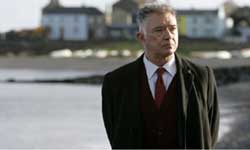Many other things we do extremely well in this golden age of the small screen. Novelists with epaulets are signing up to bang out series. David Foster Wallace thought the best writing currently done in America was for The Wire. Watching approximately 12 hours a week of great TV, I don’t regret a minute. Not even Burn Notice—maybe sometimes Burn Notice. But no, no detectives worth a lick.
American TV has a small handful of ideas about detective types. One: Dick Wolf/CSI clone cops with clip-on personalities (Chris Noth in Law & Order the exception). Two: The lone wolf with a convenient backstory that won’t be plumbed too deeply (Timothy Olyphant in Justified the exception). Or the accidental class, who stumble around finding clues. But few with more depth than a pudding cup.
So I am not a big fan. Still, there are some characters who are hard to deny. Enrique Murciano in Without a Trace, who comes across as unconsciously deep while doing his job in the manner of a glossy retriever—similar to US Soccer’s Clint Dempsey, whom he resembles. Bunk from The Wire was a rare triumph; Monk is our sad lunch. Meanwhile, across the Atlantic, David Suchet in Poirot could eat the cast of Psych with fava beans and a nice Chianti and still have room for Hugh Laurie. London rules my nights. There are a few British TV detectives who limped along—Inspector Alleyn—and some who were plucked before ripe—Clive Owen in Second Sight. Mostly, though, it’s a wonderland.
My 12th favorite contemporary British TV detective is Martin Shaw in the stylish Inspector George Gently from the Alan Hunter novels. Maybe not the 12th. Well, I intend to write here about a dozen British detectives total, and he’s not my favorite. But he rides high in my esteem; he is noble. Too handsome, but not too brilliant. Broadly minded. He’s got a grim pout that evolves over Season One to show warmth, as if the producers wanted to include an Easter egg on-screen to document the show’s bloom. Gently’s hair is windproof, bulletproof magnesium. And tragic before comic—rarely comic, but not mean. As an inspector in Northumberland, Gently is paired with a churlish, wonderfully nuanced young detective (Lee Ingleby) seeking promotion and/or life. Gently keeps the boy to heel, but his attention is inwardly directed: his own demons and those he sees outside himself. In episode one, Gently arrives onscreen steeped. God, that’s an encouraging sign when you begin a show. And as society evolves around him (the show’s set in the 1960s) he must evolve, too.
Sign of a good inspector on TV: He must change. (They’re mostly men; we’ll discuss that later.) What changes him must come from both internal and external means. He must be given the time (multiple seasons) and opportunity (multiple crimes to solve, great criminals to chase, people to love or to let down) to influence those changes. And whether he does or not succeed, we deserve the time and opportunity to judge him, and enjoy him.
That last comment’s directed to whichever asshole pulled the plug on Deadwood, you flimsy-souled fuck. Anyway, Gently, number 12, fantastic. Every episode is recommended. I would tell you the music is stupendous, too, especially for anyone who digs Richard Hawley’s guitar, but that’s for another post.
